5 Must-Have Family Board Games That Will Bring Everyone Together
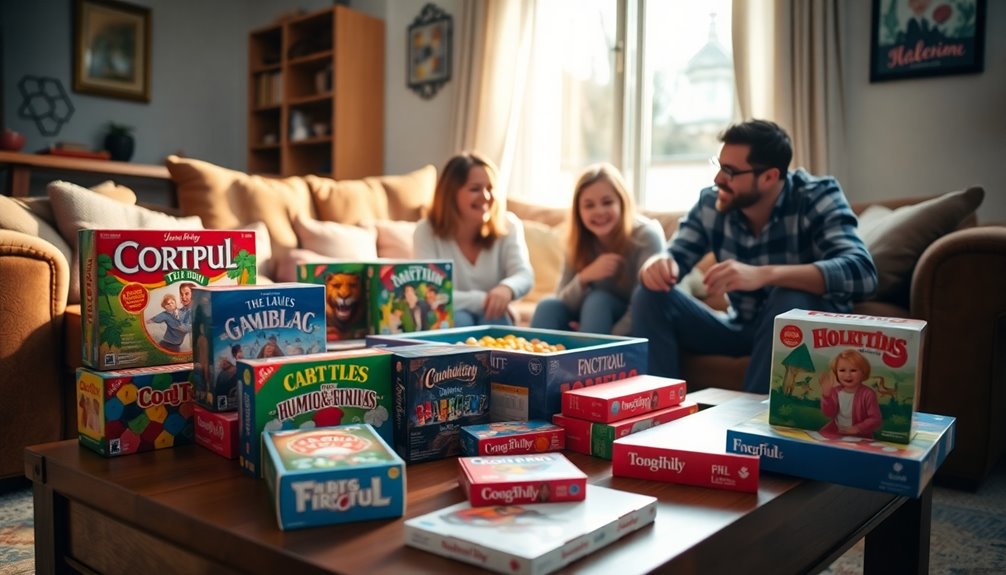
Looking to bring your family together? You can't go wrong with these five must-have board games. "Kids VS Parents" offers fun conversation starters for younger kids, while "I Should Have Known That!" challenges older players with trivia. "The Game of Life" combines fun and education for ages 8 and up, making it a classic for family bonding. Add some laughter with "Do You Really Know Your Family?" and fast-paced excitement with "You Can't Say UMM." Each of these games fosters connection and excitement, ensuring everyone has a great time. Discover what makes these games unique as you explore more options.
Key Takeaways
- Engagement and Fun: Choose games like Kids VS Parents to encourage laughter and bonding through conversation starters suitable for ages 4-12.
- Thematic Variety: Select games with diverse themes, such as career exploration in The Game of Life, to cater to different family interests.
- Age Appropriateness: Opt for games like I Should Have Known That! for teens and adults to enjoy complex trivia while engaging older family members.
- Replayability and Flexibility: Look for games with customizable rules and varied mechanics to ensure fresh experiences and accommodate different player counts.
- Educational Value: Incorporate games that promote critical thinking and collaboration, enhancing family interaction while teaching valuable skills through play.
Kids VS Parents – Family Game for Kids 4-12
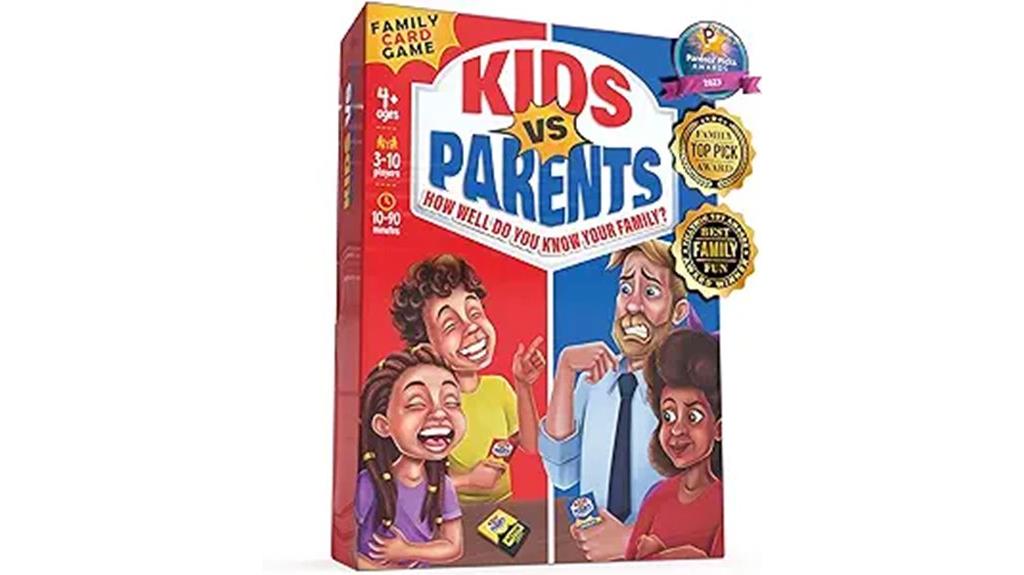
Kids VS Parents is the ultimate family card game designed specifically for children ages 4-12, making it a perfect choice for family game nights. This engaging game features 200 conversation starter cards that promote bonding, teamwork, and good sportsmanship. You'll take turns drawing cards, answering fun questions, or performing silly actions, keeping everyone entertained for 10-90 minutes. The competitive twist, where kids face off against parents, adds an exciting layer to your family interactions. Families love how it breaks the routine and encourages laughter, creating memorable moments. While some cards might be a bit too much for younger players, you can customize the experience by skipping or modifying them. Overall, it's a fantastic way to strengthen family dynamics and enjoy quality time together.
Best For: Kids aged 4-12 and their parents looking to enhance family bonding and create fun moments during game nights.
Pros:
- Promotes family bonding through interactive questions and activities, strengthening relationships.
- Engaging for all ages, making it suitable for diverse family gatherings and keeping children interested.
- Customizable experience allows parents to modify or skip inappropriate cards to match family values.
Cons:
- Some cards may be inappropriate for younger players, requiring careful review by parents.
- The competitive aspect might lead to intense moments, which could be challenging for some families.
- Gameplay duration can vary significantly, with some sessions lasting up to 90 minutes, which may not suit all players' attention spans.
I should have known that! – A Trivia Game About Things You Oughta Know
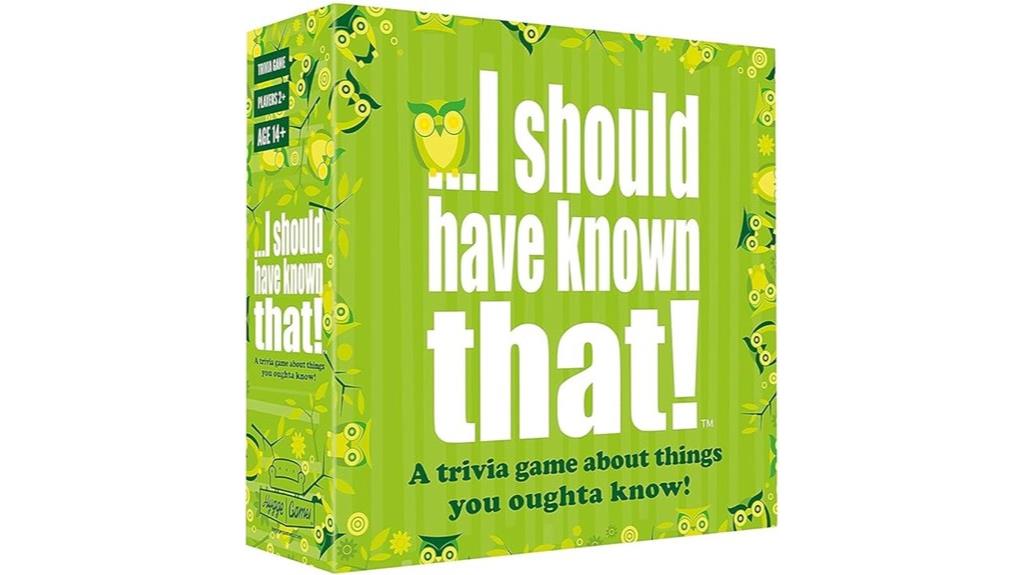
If you enjoy lively gatherings filled with friendly competition and engaging discussions, "I Should Have Known That! – A Trivia Game About Things You Oughta Know" is the perfect choice for your next family game night. This trivia game accommodates 2 or more players aged 14 and up, featuring 110 cards with over 400 diverse questions. You'll find that points are subtracted for incorrect answers, adding a twist to the fast-paced gameplay. The questions spark discussions, making it both entertaining and educational. Families across generations love it, from teens to seniors, and its compact design makes it easy to take anywhere. With customizable rules, you can tailor the experience to suit your group, ensuring everyone stays engaged and having fun.
Best For: Families and friends looking for a fun and educational trivia game that encourages interaction and lively discussions across generations.
Pros:
- Engaging gameplay that encourages quick thinking and friendly competition among players.
- Diverse topics covered in over 400 questions, appealing to a wide range of interests and knowledge levels.
- Compact and durable design makes it easy to transport and store, perfect for game nights on the go.
Cons:
- Difficulty levels vary, which may result in some players finding questions too easy or too hard.
- Points deducted for incorrect answers may discourage less confident players from participating actively.
- May appeal more to younger audiences, potentially limiting its attraction for older players who prefer challenging trivia.
Hasbro Gaming The Game of Life Board Game for Kids Ages 8
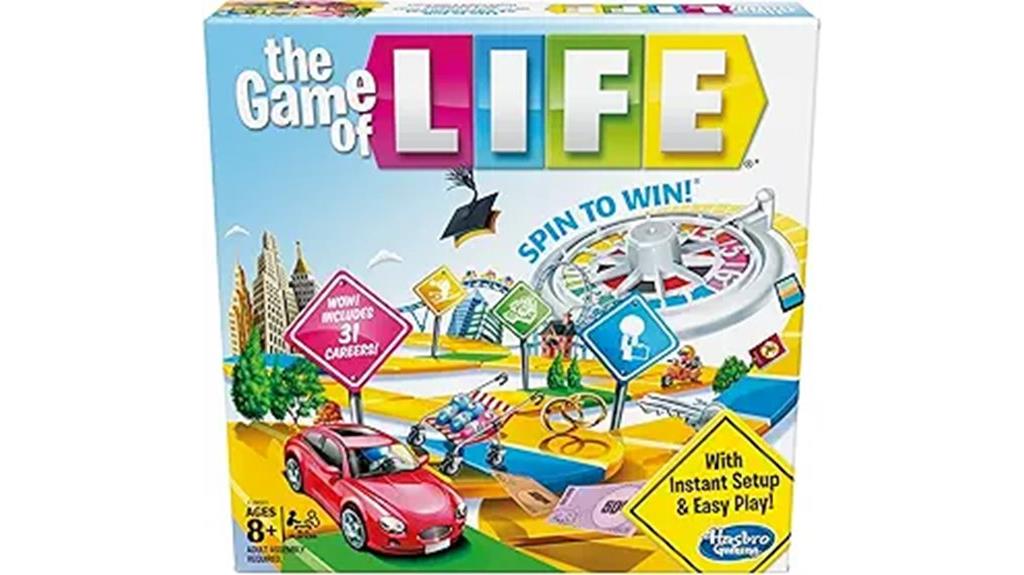
The Game of Life Board Game by Hasbro Gaming is perfect for families looking to engage children ages 8 and up in a fun and educational experience. This game features 31 unique Career cards, from ice cream flavor maker to secret agent, providing exciting choices as you navigate life's twists and turns. With 115 cards to explore, players spin to accumulate wealth while learning about responsibilities and decision-making. Ideal for 2-4 players, it promotes family bonding and quality time. Many appreciate its modern updates compared to the original 90s version, enjoying a typical playtime of about an hour and a half. Plus, it arrives in excellent condition, making it a favorite gift for friends and family alike.
Best For: Families with children ages 8 and up who are looking for a fun and educational board game experience.
Pros:
- Engaging gameplay with modern twists and a variety of unique career choices.
- Promotes family bonding and teaches children about responsibilities and decision-making.
- Quick setup and playtime of about an hour and a half, making it accessible for kids.
Cons:
- Limited to 2-4 players, which may require improvisation for larger families.
- Some players request additional components to enhance the gaming experience.
- Not all families may find the career options relatable or appealing.
Family Game with Conversation Starters and Challenges
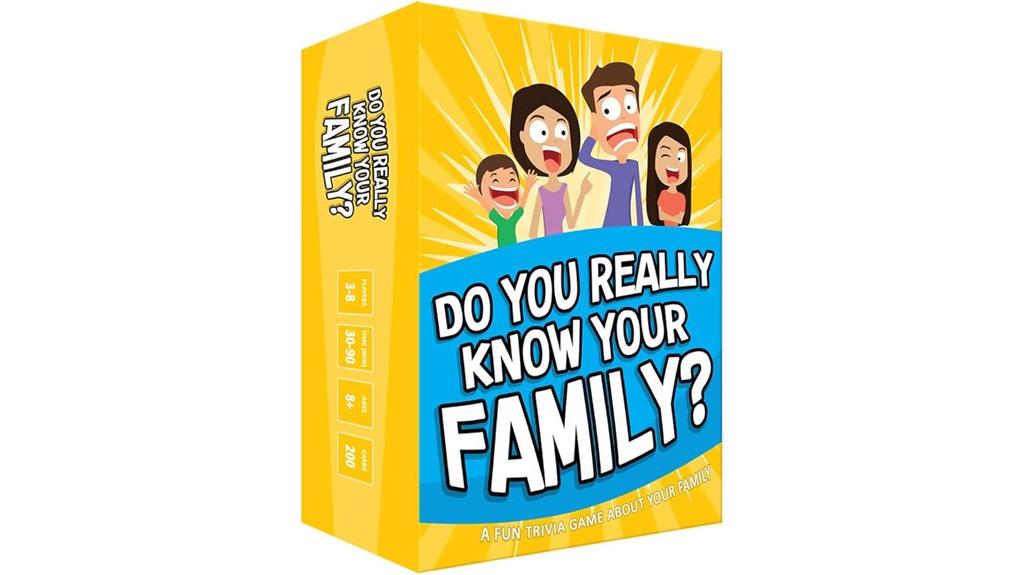
Looking for a way to spark laughter and meaningful conversations during your next family gathering? "Do You Really Know Your Family?" is an ideal choice, designed for family members aged 8 and up. This engaging card game features trivia questions and silly challenges that not only entertain but also encourage deeper connections. Players take turns answering questions or completing challenges to collect cards, aiming for a set number to win. It's easy to learn, making it perfect for both small and large groups. Many families have found it's a fantastic icebreaker, leading to unexpected discussions and shared laughter. With its versatility, you can enjoy it during holidays or regular get-togethers, creating memorable moments together.
Best For: Families looking to enhance bonding and communication through fun and engaging activities.
Pros:
- Encourages meaningful conversations and family bonding.
- Easy to learn and suitable for all ages, making it inclusive for various family members.
- Versatile for different occasions, from holiday celebrations to regular gatherings.
Cons:
- May require a larger group for maximum enjoyment.
- Depending on family dynamics, some may feel uncomfortable with certain challenges or questions.
- Limited replay value if played frequently with the same group without variations in questions or challenges.
You Can't Say UMM: A Fast-Paced Family Word Game

You Can't Say UMM is perfect for families and friends who enjoy a lively challenge and want to spark laughter during game nights. In this fast-paced word game, you'll describe random items to your teammates without using verbal fillers like "Umm," "Err," or "Ah." The opposing team listens intently, ready to score points if you slip up. To amp up the fun, you can introduce new challenges, such as reading cards in a silly voice or avoiding specific letters. The intensity increases with a bell that signals when a player's caught. Easy to learn and quick to play, it's ideal for any gathering, making everyone laugh until it hurts. Plus, you can expand the game with additional cards for endless enjoyment!
Best For: Families and friends looking for a fun and interactive game that encourages laughter and communication.
Pros:
- Engaging Gameplay: The fast-paced nature keeps players excited and involved.
- Humorous Challenge: It highlights common speech habits, making for a funny experience.
- Expandable Content: Additional card packs and custom rules can enhance gameplay.
Cons:
- Potential Frustration: Players may find it challenging to avoid verbal fillers under pressure.
- Limited Player Interaction: The game is primarily focused on describing and guessing, which might not suit everyone.
- Requires Attention: Players need to stay alert to catch fillers, which might be taxing for some.
Factors to Consider When Choosing Must-Have Family Board Games

When picking must-have family board games, it's essential to take into account factors like age appropriateness and player count flexibility. You'll want games that keep everyone engaged and fit within your family's schedule. Don't forget to weigh the educational value—games can be fun and teach something valuable at the same time!
Age Appropriateness
Choosing the right family board games hinges on understanding age appropriateness, as each game's recommended age range plays an important role in guaranteeing everyone can fully engage. When you select games, consider the age of your players to guarantee they can grasp the content and mechanics effectively. Games designed for younger children, typically ages 4-12, often feature simpler rules and themes that align with their cognitive and emotional development.
On the other hand, games aimed at ages 14 and up may include complex strategies or mature topics that could frustrate younger players, leading to disengagement. You want the experience to be enjoyable for everyone, so picking age-appropriate games is vital. These games often incorporate language and scenarios that resonate with their intended audience, making gameplay more relatable and fun.
Moreover, considering age range fosters inclusivity within your family, allowing members of various ages to participate and bond over shared experiences. By choosing games that cater to different age groups, you can create lasting memories and strengthen family ties through enjoyable gameplay.
Game Duration
Game duration is an important factor to take into account when selecting must-have family board games, as it can greatly impact the overall enjoyment of the experience. Family board games can vary considerably in length, ranging from quick sessions of 10-30 minutes to longer ones lasting 60-90 minutes or more.
If you're playing with younger children or hosting a casual gathering, shorter games might be more suitable. They keep everyone engaged without overwhelming players, making it easier for kids to stay focused. On the other hand, if you're planning a dedicated family game night, longer games can offer a more immersive experience, allowing for deeper strategy and interaction.
It's vital to take into account the attention span of all players involved. Games with shorter durations can help retain interest, especially for younger participants. Additionally, selecting games with flexible playtime options can enhance your family gatherings. This way, you can enjoy quick rounds when time is limited or extend the fun with longer sessions when everyone's available. Balancing game duration with your family's preferences will guarantee a more enjoyable gaming experience for everyone involved.
Player Count Flexibility
Considering the diverse preferences of family members is essential for selecting board games that can accommodate various player counts. Look for games that cater to both small groups of 2-4 players and larger gatherings of 6 or more. This flexibility enhances inclusivity, making it easier for everyone to join in on the fun.
Games with adjustable player mechanics can foster engagement among family members of different ages and interests. When you choose games that feature team-based play, you'll enable larger groups to split into teams, creating a competitive yet collaborative atmosphere. This arrangement guarantees that everyone feels involved, regardless of the number of players.
Additionally, many games offer alternative rules or expansions that allow for extra players, making them versatile for different family sizes and event types. This adaptability can greatly influence the game's pacing and engagement level, allowing for shorter or longer sessions based on your family's availability and preferences.
Educational Value
While family board games are a source of entertainment, their educational value shouldn't be overlooked. When choosing games, think about how they can enhance critical thinking and problem-solving skills. Many educational board games challenge players to develop cognitive abilities while having fun, making learning feel effortless.
Look for games that include trivia or knowledge-based questions, as these can broaden your understanding of subjects like history, science, and literature. In addition, consider games focused on financial literacy. They teach valuable lessons on managing resources and budgeting, which can help you make informed decisions in real life.
Interactive gameplay also promotes communication and collaboration among family members. By playing together, you'll enhance social skills and teamwork, making for a more connected family dynamic. Moreover, games that incorporate creative challenges and conversation starters can improve emotional intelligence. These elements encourage meaningful discussions, fostering deeper connections within your family.
Ultimately, the right family board games can be both enjoyable and educational. By prioritizing these factors, you'll guarantee that your family time is not just entertaining but also enriching for everyone involved.
Engagement Level
When selecting family board games, the engagement level plays a significant role in guaranteeing everyone has a great time. You want games that keep everyone actively participating, as higher engagement leads to memorable interactions. Look for games that incorporate conversation starters or creative challenges; these not only spark laughter but also deepen connections among players of all ages.
Fast-paced games are another great choice. They require quick thinking and interaction, which helps maintain excitement and keeps everyone involved. Additionally, opt for games that allow for customizable rules or varied gameplay experiences. This flexibility caters to different preferences and skill levels, enhancing overall engagement.
Consider games that include physical activity or team-based mechanics. These elements promote collaboration and friendly competition, making the experience even more enjoyable for your family. Overall, prioritize engagement when choosing your family board games. The more active everyone is during gameplay, the more fun and laughter you'll share, creating cherished memories that last long after the game ends. With the right game, you'll guarantee that every family game night is an experience to remember.
Replayability Factor
Replayability is an essential factor that can make or break your family board game experience. When choosing a game, look for those with a variety of gameplay mechanics, like different card types or scenarios. This variety allows for unique experiences each time you play, keeping everyone on their toes.
Customizable content or adjustable rules can also cater to your family's dynamics, ensuring that no two sessions feel the same. A game with diverse question topics or challenges keeps things fresh, as players will uncover new information and strategies during repeated plays.
Balance is vital, too; games that mix competitive and cooperative elements encourage families to revisit them. You'll want to improve your teamwork or individual performance, making each session feel rewarding.
Finally, consider the positive player experiences that arise during the game. Laughter, surprising revelations, and memorable interactions can foster a stronger family bond, driving the desire to play again. When you select games with high replayability, you're not just picking a game; you're investing in countless fun-filled family moments that everyone will cherish.
Theme and Content
Choosing the right theme and content for a family board game can elevate your game night experience. Start by considering age appropriateness. You want a game that everyone, from the youngest member to the adults, can enjoy together, typically suitable for ages 4 and up.
Next, think about how the game fosters family bonding and interaction. Games that include conversation starters or team challenges can enhance engagement and promote laughter, making your time together more memorable. Look for titles that incorporate educational elements; these games allow you to learn new trivia or skills while having fun, ideal for family gatherings.
Assess the thematic variety available. Whether it's career exploration, trivia knowledge, or light-hearted challenges, choose a game that aligns with your family's interests. Finally, verify the content reflects your family's values. Some games might have cards or questions that aren't suitable for younger audiences. By thoughtfully considering these factors, you can select a board game that not only entertains but also strengthens your family bonds, creating lasting memories for everyone involved.
Complexity and Rules
The complexity of rules plays a crucial role in making family board games enjoyable for everyone involved. When you're selecting a game, consider how easy the rules are to understand, especially for younger players. Simple mechanics often lead to quicker setup and gameplay, making them perfect for those spontaneous family gatherings.
Look for games that offer customizable rules, as this can cater to different age groups and skill levels. This flexibility enhances everyone's experience, allowing everyone to participate fully. Striking a balance between complexity and simplicity keeps older children and adults engaged without alienating younger players. It promotes inclusive participation, which is key for family bonding.
Fast-paced games with straightforward rules can also encourage interaction and maintain everyone's attention, making the game night more enjoyable. Remember, the goal is to create lasting memories together. By focusing on the complexity of the rules, you'll guarantee that everyone—from the youngest to the oldest—can join in the fun without feeling lost or bored. So, take the time to evaluate the rules before making your choice, and you'll be well on your way to a fantastic family board game experience!
Frequently Asked Questions
How Long Does Each Game Typically Take to Play?
Each game typically takes anywhere from 30 minutes to a few hours to play, depending on its complexity and the number of players. You'll find that some quick games can wrap up in under 30 minutes, while others, like strategy-based ones, might last over two hours. It's a good idea to check the game's box for an estimated playtime, so you can plan your game night accordingly and keep everyone engaged.
Are These Games Suitable for Large Family Gatherings?
Absolutely, these games are perfect for large family gatherings! They're designed to accommodate multiple players, so everyone can join in on the fun. You'll find that the dynamics of these games foster interaction and laughter, making them ideal for big groups. Plus, they often include team play options, which can enhance the experience even further. So, gather your family, set up the games, and enjoy some quality time together!
Can These Games Be Played by Younger Children?
Absolutely, many of these games are designed with younger children in mind. They often feature simple rules and engaging themes that keep kids entertained. You'll find that some games offer adjustable difficulty levels, allowing everyone to play together regardless of age. Just check the age recommendations on the box before you start, and you'll guarantee that younger players can join in on the fun without feeling overwhelmed.
What Is the Recommended Number of Players for Each Game?
The recommended number of players varies for each game, so it's important to check the specifics before you play. Generally, most board games accommodate anywhere from two to six players, which allows for both small and larger groups. Some games may even support more players with expansions or variations. Be sure to contemplate the player count to guarantee everyone can join in on the fun and enjoy the experience together!
Are There Any Expansions Available for These Games?
Imagine a garden where every flower represents a game, each thriving with its own unique expansions. Yes, many popular games do offer expansions that enhance gameplay and add new layers of strategy. You'll find additional characters, scenarios, or challenges that breathe fresh life into your favorite titles. By exploring these expansions, you can cultivate deeper connections and excitement, ensuring that your game nights bloom with joy and creativity for everyone involved.
Conclusion
Gathering around a board game is like planting a seed in your family's garden—each game nurtures connections and laughter, helping relationships grow. As you roll the dice and share stories, you'll discover that these moments become the roots of cherished memories. Whether you're debating trivia or racing through the Game of Life, these must-have games create a vibrant tapestry of togetherness. So, grab your favorite game and watch your family's bond flourish!








 Wishlist
Wishlist